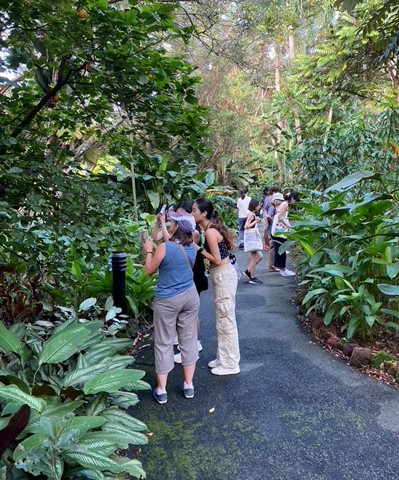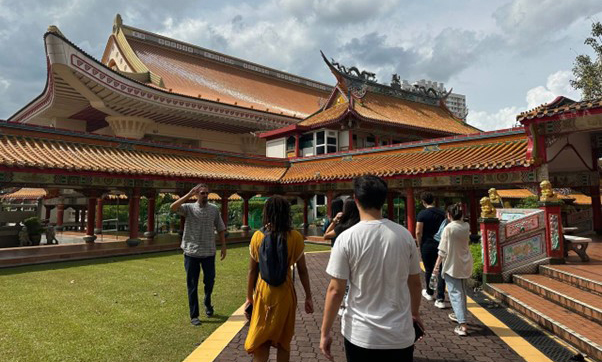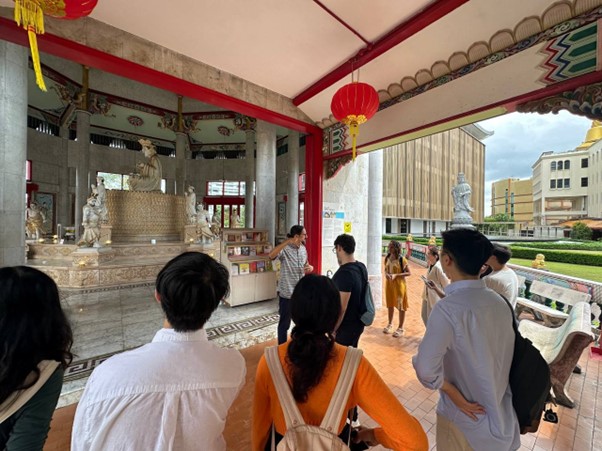Yale-NUS students enliven their learning through field trips as part of their classes
Students highlight how field trips have enriched their learning and provided different perspectives
Early into the new semester, several classes have already taken Yale-NUS College students on field trips to experience how their learnings apply outside the classroom. These field trips ranged from a visit to Singapore’s Urban Redevelopment Authority to learn about urban planning to a walk around the National Gallery Singapore for Singapore Art Week, which took place in January 2024. While some field trips are one-off or event-based, there are also courses which take students on multiple field trips throughout the semester to help them gain wider exposure and a deeper hands-on experience.
One such course is Plants and People where students visited the Singapore Botanic Gardens on a walking tour to study first-hand how flower structures and seeds vary across different plant species. The class, led by Senior Visiting Lecturer of Science (Environmental Studies) Linda Margaret Puth, provides an introduction to plant biology as well as agriculture and ecology. Field trips are a crucial component of the module, with eight field trips planned in total, including visits to Bollywood Farms and Rifle Range Nature Park. The visit to Singapore Botanic Gardens marked the first field trip for the class.
 Dr Linda Puth (pictured front) guiding students from the Plants and People class through the rainforest area of the Singapore Botanic Gardens. Image provided by Siddharth Chintalacheruvu.
Dr Linda Puth (pictured front) guiding students from the Plants and People class through the rainforest area of the Singapore Botanic Gardens. Image provided by Siddharth Chintalacheruvu.
Aye Chan Phyu Sin (Class of 2024) described how Dr Linda Puth guided the class in connecting theoretical concepts to actual observed plant structures: “It was illuminating walking around with Dr Puth and stopping to observe plant structures that were adapted for pollination and seed dispersal. I also found the diversity in plants to be really fascinating – ginger plants come in so many shapes and varieties that I never knew about.”
Aye Chan, who does not have a science background, added that the class greatly enriched her understanding of plant biology concepts. “The field trip was timed well to consolidate my understanding of concepts in class which can feel overly theoretical at times”, she remarked.
Opportunities where students get to experience how abstract concepts coalesce in the real world are highlights of field trips. In the Ecovillages and Ecotopias course led by Senior Lecturer of Social Sciences (Environmental Humanities, Sustainable Agriculture) Todd Jared LeVasseur, field trips help students to envision utopic ways of living in the Anthropocene.

 Dr Todd LeVasseur guiding students of Ecovillages and Ecotopias around the Kong Meng San Phor Kark See Monastery. Images provided by Aye Chan Phyu Sin.
Dr Todd LeVasseur guiding students of Ecovillages and Ecotopias around the Kong Meng San Phor Kark See Monastery. Images provided by Aye Chan Phyu Sin.
Dr LeVasseur organised a trip to the Kong Meng San Phor Kark See (KMSPKS) Monastery to learn more about intentional spaces and the monastic lifeway. The KMSPKS Monastery was built in the early 20th century and is the largest Buddhist temple in Singapore. It also provides lodging for monks.
Rachel Tey (Class of 2024) appreciated the atmosphere and beauty of the monastery. She commented, “Entering the monastery felt like a getaway from the dense, fast-paced and bustling dynamic of the city.” Stepping into the impressive meditation hall, Rachel added that “entering the vast spaces of quiet and stillness made [her] feel at peace.”
Jaren Tan (Class of 2024) felt that going to the KMSPKS Monastery provided him with a valuable perspective on how intentional living can take tangible form through the monks’ unique way of life. “Everyone in the monastery lived with purpose and intention. It was a short but beautiful glimpse into how people can build self-sufficient, sustainable lives within a busy city-state like Singapore where the pace of living can get overwhelming”, Jaren shared.
Both field trips left students with a greater appreciation for class material as they interacted with the respective environments that related to their learnings. The combination of small classes and insightful faculty who organised these trips provided students with inspiring takeaways from their lessons.





